Sustainable & Responsible Tourism Management: Strategies & Impact
VerifiedAdded on 2023/01/05
|14
|4410
|65
Report
AI Summary
This report provides a detailed analysis of sustainable and responsible tourism management, emphasizing the roles of global organizations like GSTC and UNESCO. It explores the principles and processes of tourism development and planning, highlighting the economic, social, cultural, and environmental impacts of tourism activities. The report also examines how sustainability is developed and managed in various tourist destinations worldwide, using Switzerland and its skiing sports industry as a case study. It assesses the contributions of stakeholders in minimizing adverse impacts and achieving sustainable objectives. Furthermore, the report discusses the successes and failures of sustainable management in different destinations and offers recommendations for improving sustainable development practices. Desklib provides access to this and other solved assignments for students.
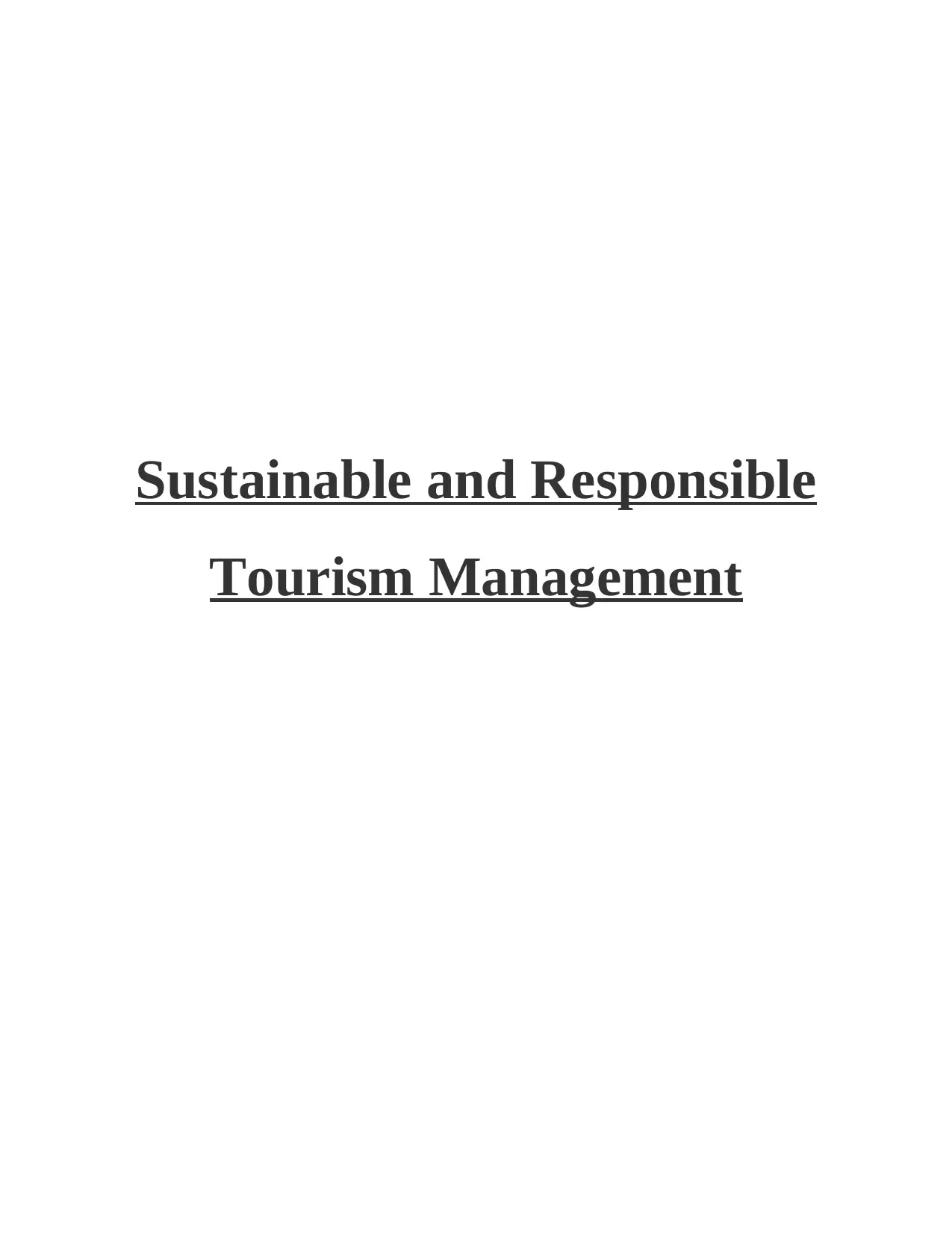
Sustainable and Responsible
Tourism Management
Tourism Management
Paraphrase This Document
Need a fresh take? Get an instant paraphrase of this document with our AI Paraphraser
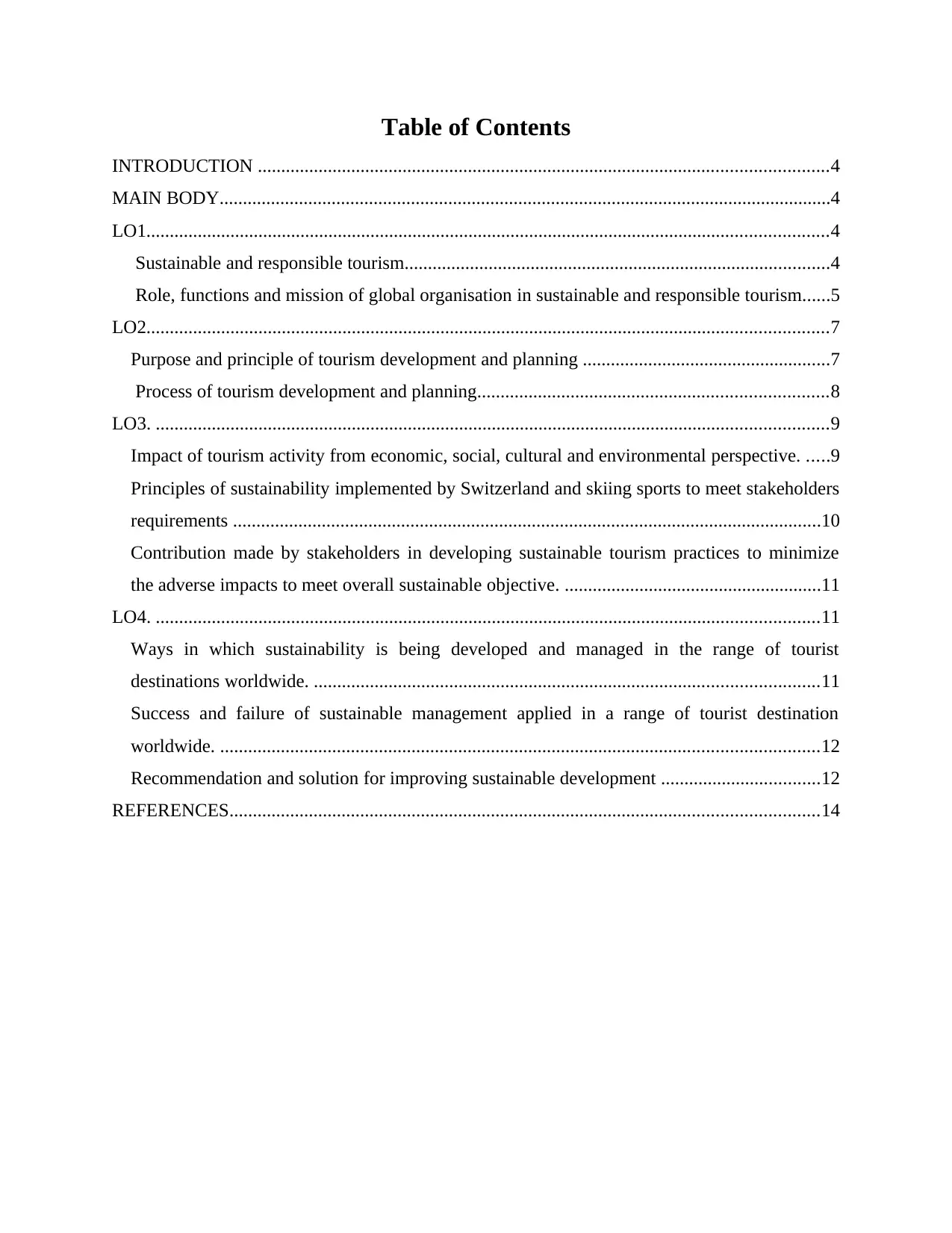
Table of Contents
INTRODUCTION ..........................................................................................................................4
MAIN BODY...................................................................................................................................4
LO1..................................................................................................................................................4
Sustainable and responsible tourism...........................................................................................4
Role, functions and mission of global organisation in sustainable and responsible tourism......5
LO2..................................................................................................................................................7
Purpose and principle of tourism development and planning .....................................................7
Process of tourism development and planning...........................................................................8
LO3. ................................................................................................................................................9
Impact of tourism activity from economic, social, cultural and environmental perspective. .....9
Principles of sustainability implemented by Switzerland and skiing sports to meet stakeholders
requirements ..............................................................................................................................10
Contribution made by stakeholders in developing sustainable tourism practices to minimize
the adverse impacts to meet overall sustainable objective. .......................................................11
LO4. ..............................................................................................................................................11
Ways in which sustainability is being developed and managed in the range of tourist
destinations worldwide. ............................................................................................................11
Success and failure of sustainable management applied in a range of tourist destination
worldwide. ................................................................................................................................12
Recommendation and solution for improving sustainable development ..................................12
REFERENCES..............................................................................................................................14
INTRODUCTION ..........................................................................................................................4
MAIN BODY...................................................................................................................................4
LO1..................................................................................................................................................4
Sustainable and responsible tourism...........................................................................................4
Role, functions and mission of global organisation in sustainable and responsible tourism......5
LO2..................................................................................................................................................7
Purpose and principle of tourism development and planning .....................................................7
Process of tourism development and planning...........................................................................8
LO3. ................................................................................................................................................9
Impact of tourism activity from economic, social, cultural and environmental perspective. .....9
Principles of sustainability implemented by Switzerland and skiing sports to meet stakeholders
requirements ..............................................................................................................................10
Contribution made by stakeholders in developing sustainable tourism practices to minimize
the adverse impacts to meet overall sustainable objective. .......................................................11
LO4. ..............................................................................................................................................11
Ways in which sustainability is being developed and managed in the range of tourist
destinations worldwide. ............................................................................................................11
Success and failure of sustainable management applied in a range of tourist destination
worldwide. ................................................................................................................................12
Recommendation and solution for improving sustainable development ..................................12
REFERENCES..............................................................................................................................14

⊘ This is a preview!⊘
Do you want full access?
Subscribe today to unlock all pages.

Trusted by 1+ million students worldwide
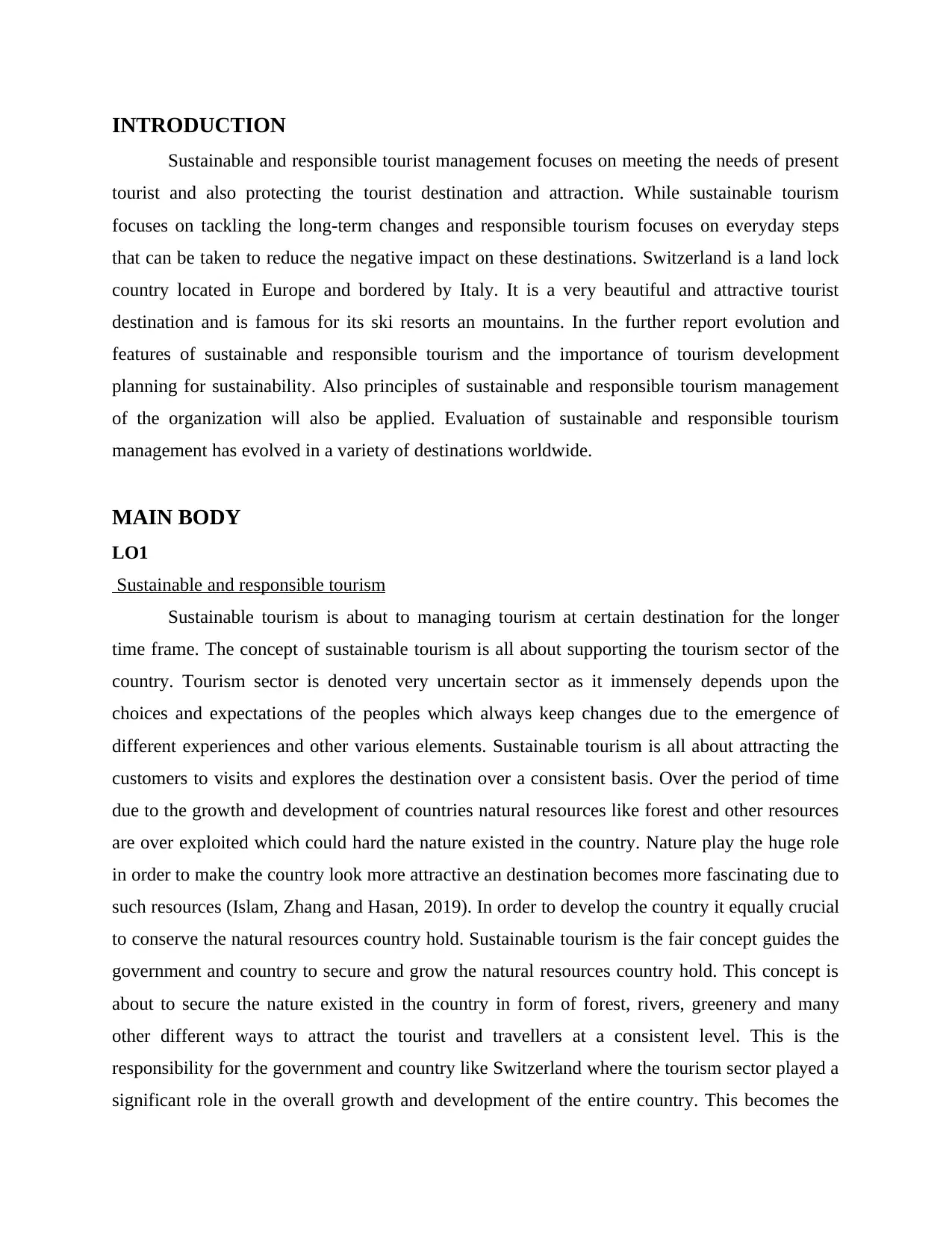
INTRODUCTION
Sustainable and responsible tourist management focuses on meeting the needs of present
tourist and also protecting the tourist destination and attraction. While sustainable tourism
focuses on tackling the long-term changes and responsible tourism focuses on everyday steps
that can be taken to reduce the negative impact on these destinations. Switzerland is a land lock
country located in Europe and bordered by Italy. It is a very beautiful and attractive tourist
destination and is famous for its ski resorts an mountains. In the further report evolution and
features of sustainable and responsible tourism and the importance of tourism development
planning for sustainability. Also principles of sustainable and responsible tourism management
of the organization will also be applied. Evaluation of sustainable and responsible tourism
management has evolved in a variety of destinations worldwide.
MAIN BODY
LO1
Sustainable and responsible tourism
Sustainable tourism is about to managing tourism at certain destination for the longer
time frame. The concept of sustainable tourism is all about supporting the tourism sector of the
country. Tourism sector is denoted very uncertain sector as it immensely depends upon the
choices and expectations of the peoples which always keep changes due to the emergence of
different experiences and other various elements. Sustainable tourism is all about attracting the
customers to visits and explores the destination over a consistent basis. Over the period of time
due to the growth and development of countries natural resources like forest and other resources
are over exploited which could hard the nature existed in the country. Nature play the huge role
in order to make the country look more attractive an destination becomes more fascinating due to
such resources (Islam, Zhang and Hasan, 2019). In order to develop the country it equally crucial
to conserve the natural resources country hold. Sustainable tourism is the fair concept guides the
government and country to secure and grow the natural resources country hold. This concept is
about to secure the nature existed in the country in form of forest, rivers, greenery and many
other different ways to attract the tourist and travellers at a consistent level. This is the
responsibility for the government and country like Switzerland where the tourism sector played a
significant role in the overall growth and development of the entire country. This becomes the
Sustainable and responsible tourist management focuses on meeting the needs of present
tourist and also protecting the tourist destination and attraction. While sustainable tourism
focuses on tackling the long-term changes and responsible tourism focuses on everyday steps
that can be taken to reduce the negative impact on these destinations. Switzerland is a land lock
country located in Europe and bordered by Italy. It is a very beautiful and attractive tourist
destination and is famous for its ski resorts an mountains. In the further report evolution and
features of sustainable and responsible tourism and the importance of tourism development
planning for sustainability. Also principles of sustainable and responsible tourism management
of the organization will also be applied. Evaluation of sustainable and responsible tourism
management has evolved in a variety of destinations worldwide.
MAIN BODY
LO1
Sustainable and responsible tourism
Sustainable tourism is about to managing tourism at certain destination for the longer
time frame. The concept of sustainable tourism is all about supporting the tourism sector of the
country. Tourism sector is denoted very uncertain sector as it immensely depends upon the
choices and expectations of the peoples which always keep changes due to the emergence of
different experiences and other various elements. Sustainable tourism is all about attracting the
customers to visits and explores the destination over a consistent basis. Over the period of time
due to the growth and development of countries natural resources like forest and other resources
are over exploited which could hard the nature existed in the country. Nature play the huge role
in order to make the country look more attractive an destination becomes more fascinating due to
such resources (Islam, Zhang and Hasan, 2019). In order to develop the country it equally crucial
to conserve the natural resources country hold. Sustainable tourism is the fair concept guides the
government and country to secure and grow the natural resources country hold. This concept is
about to secure the nature existed in the country in form of forest, rivers, greenery and many
other different ways to attract the tourist and travellers at a consistent level. This is the
responsibility for the government and country like Switzerland where the tourism sector played a
significant role in the overall growth and development of the entire country. This becomes the
Paraphrase This Document
Need a fresh take? Get an instant paraphrase of this document with our AI Paraphraser
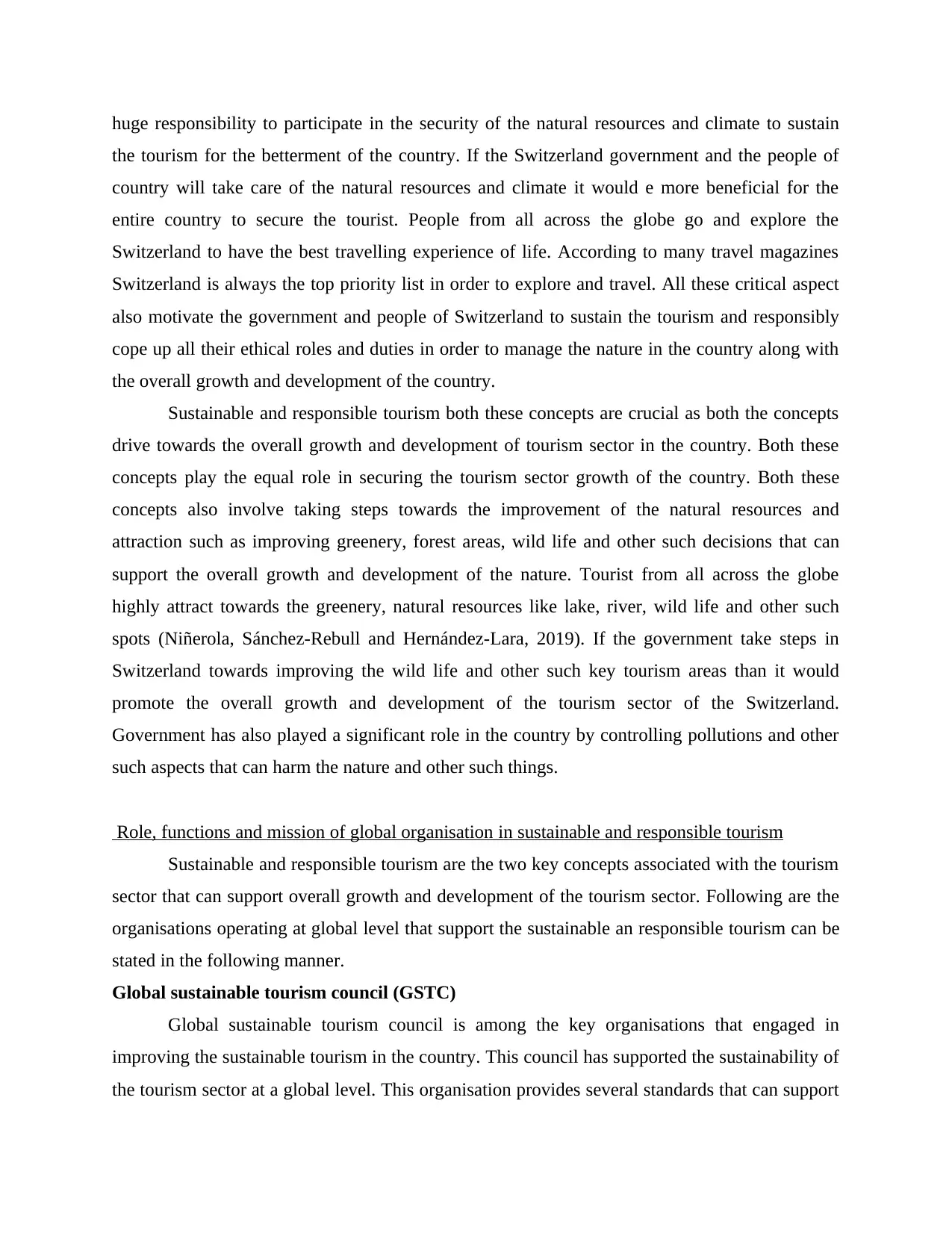
huge responsibility to participate in the security of the natural resources and climate to sustain
the tourism for the betterment of the country. If the Switzerland government and the people of
country will take care of the natural resources and climate it would e more beneficial for the
entire country to secure the tourist. People from all across the globe go and explore the
Switzerland to have the best travelling experience of life. According to many travel magazines
Switzerland is always the top priority list in order to explore and travel. All these critical aspect
also motivate the government and people of Switzerland to sustain the tourism and responsibly
cope up all their ethical roles and duties in order to manage the nature in the country along with
the overall growth and development of the country.
Sustainable and responsible tourism both these concepts are crucial as both the concepts
drive towards the overall growth and development of tourism sector in the country. Both these
concepts play the equal role in securing the tourism sector growth of the country. Both these
concepts also involve taking steps towards the improvement of the natural resources and
attraction such as improving greenery, forest areas, wild life and other such decisions that can
support the overall growth and development of the nature. Tourist from all across the globe
highly attract towards the greenery, natural resources like lake, river, wild life and other such
spots (Niñerola, Sánchez-Rebull and Hernández-Lara, 2019). If the government take steps in
Switzerland towards improving the wild life and other such key tourism areas than it would
promote the overall growth and development of the tourism sector of the Switzerland.
Government has also played a significant role in the country by controlling pollutions and other
such aspects that can harm the nature and other such things.
Role, functions and mission of global organisation in sustainable and responsible tourism
Sustainable and responsible tourism are the two key concepts associated with the tourism
sector that can support overall growth and development of the tourism sector. Following are the
organisations operating at global level that support the sustainable an responsible tourism can be
stated in the following manner.
Global sustainable tourism council (GSTC)
Global sustainable tourism council is among the key organisations that engaged in
improving the sustainable tourism in the country. This council has supported the sustainability of
the tourism sector at a global level. This organisation provides several standards that can support
the tourism for the betterment of the country. If the Switzerland government and the people of
country will take care of the natural resources and climate it would e more beneficial for the
entire country to secure the tourist. People from all across the globe go and explore the
Switzerland to have the best travelling experience of life. According to many travel magazines
Switzerland is always the top priority list in order to explore and travel. All these critical aspect
also motivate the government and people of Switzerland to sustain the tourism and responsibly
cope up all their ethical roles and duties in order to manage the nature in the country along with
the overall growth and development of the country.
Sustainable and responsible tourism both these concepts are crucial as both the concepts
drive towards the overall growth and development of tourism sector in the country. Both these
concepts play the equal role in securing the tourism sector growth of the country. Both these
concepts also involve taking steps towards the improvement of the natural resources and
attraction such as improving greenery, forest areas, wild life and other such decisions that can
support the overall growth and development of the nature. Tourist from all across the globe
highly attract towards the greenery, natural resources like lake, river, wild life and other such
spots (Niñerola, Sánchez-Rebull and Hernández-Lara, 2019). If the government take steps in
Switzerland towards improving the wild life and other such key tourism areas than it would
promote the overall growth and development of the tourism sector of the Switzerland.
Government has also played a significant role in the country by controlling pollutions and other
such aspects that can harm the nature and other such things.
Role, functions and mission of global organisation in sustainable and responsible tourism
Sustainable and responsible tourism are the two key concepts associated with the tourism
sector that can support overall growth and development of the tourism sector. Following are the
organisations operating at global level that support the sustainable an responsible tourism can be
stated in the following manner.
Global sustainable tourism council (GSTC)
Global sustainable tourism council is among the key organisations that engaged in
improving the sustainable tourism in the country. This council has supported the sustainability of
the tourism sector at a global level. This organisation provides several standards that can support
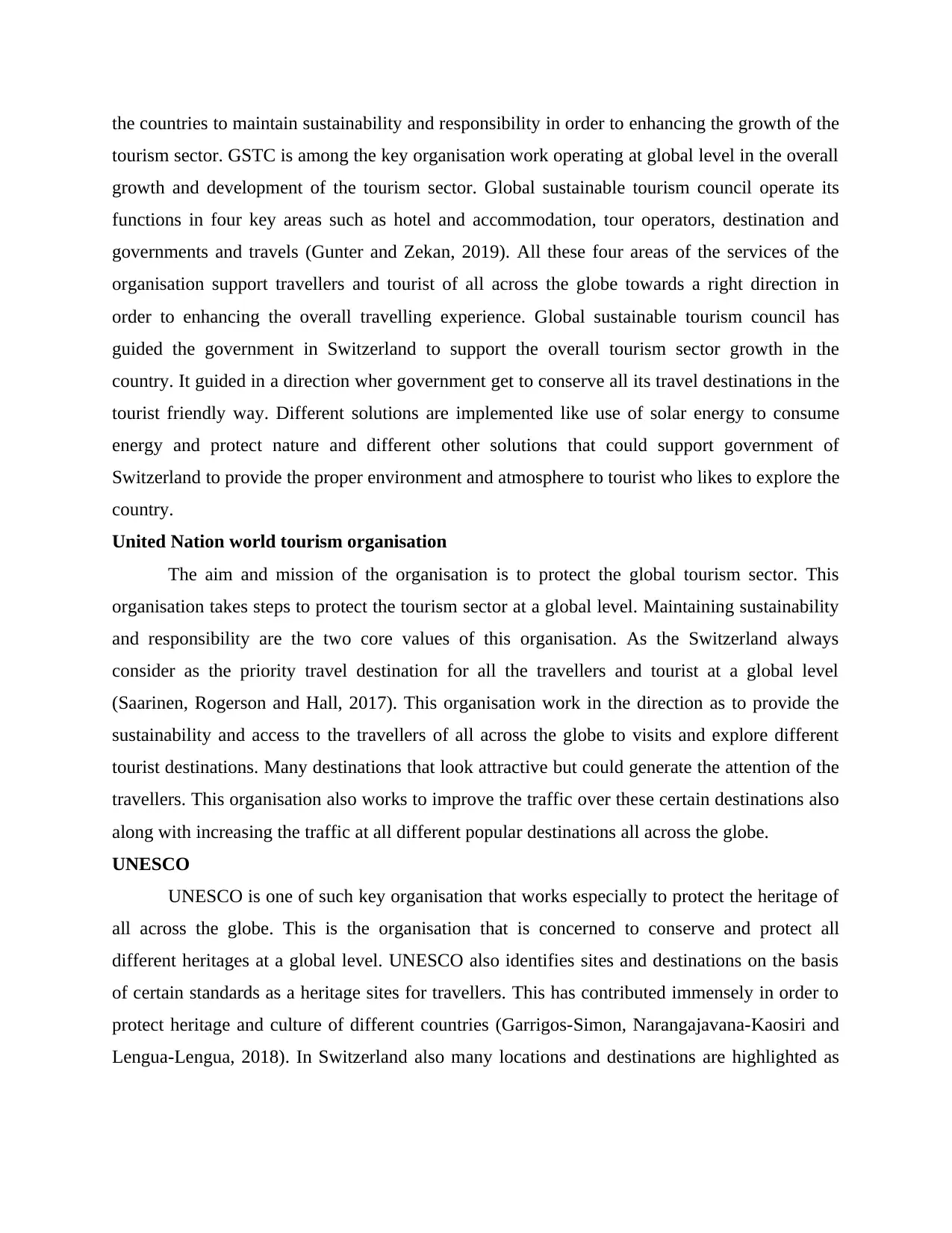
the countries to maintain sustainability and responsibility in order to enhancing the growth of the
tourism sector. GSTC is among the key organisation work operating at global level in the overall
growth and development of the tourism sector. Global sustainable tourism council operate its
functions in four key areas such as hotel and accommodation, tour operators, destination and
governments and travels (Gunter and Zekan, 2019). All these four areas of the services of the
organisation support travellers and tourist of all across the globe towards a right direction in
order to enhancing the overall travelling experience. Global sustainable tourism council has
guided the government in Switzerland to support the overall tourism sector growth in the
country. It guided in a direction wher government get to conserve all its travel destinations in the
tourist friendly way. Different solutions are implemented like use of solar energy to consume
energy and protect nature and different other solutions that could support government of
Switzerland to provide the proper environment and atmosphere to tourist who likes to explore the
country.
United Nation world tourism organisation
The aim and mission of the organisation is to protect the global tourism sector. This
organisation takes steps to protect the tourism sector at a global level. Maintaining sustainability
and responsibility are the two core values of this organisation. As the Switzerland always
consider as the priority travel destination for all the travellers and tourist at a global level
(Saarinen, Rogerson and Hall, 2017). This organisation work in the direction as to provide the
sustainability and access to the travellers of all across the globe to visits and explore different
tourist destinations. Many destinations that look attractive but could generate the attention of the
travellers. This organisation also works to improve the traffic over these certain destinations also
along with increasing the traffic at all different popular destinations all across the globe.
UNESCO
UNESCO is one of such key organisation that works especially to protect the heritage of
all across the globe. This is the organisation that is concerned to conserve and protect all
different heritages at a global level. UNESCO also identifies sites and destinations on the basis
of certain standards as a heritage sites for travellers. This has contributed immensely in order to
protect heritage and culture of different countries (Garrigos-Simon, Narangajavana-Kaosiri and
Lengua-Lengua, 2018). In Switzerland also many locations and destinations are highlighted as
tourism sector. GSTC is among the key organisation work operating at global level in the overall
growth and development of the tourism sector. Global sustainable tourism council operate its
functions in four key areas such as hotel and accommodation, tour operators, destination and
governments and travels (Gunter and Zekan, 2019). All these four areas of the services of the
organisation support travellers and tourist of all across the globe towards a right direction in
order to enhancing the overall travelling experience. Global sustainable tourism council has
guided the government in Switzerland to support the overall tourism sector growth in the
country. It guided in a direction wher government get to conserve all its travel destinations in the
tourist friendly way. Different solutions are implemented like use of solar energy to consume
energy and protect nature and different other solutions that could support government of
Switzerland to provide the proper environment and atmosphere to tourist who likes to explore the
country.
United Nation world tourism organisation
The aim and mission of the organisation is to protect the global tourism sector. This
organisation takes steps to protect the tourism sector at a global level. Maintaining sustainability
and responsibility are the two core values of this organisation. As the Switzerland always
consider as the priority travel destination for all the travellers and tourist at a global level
(Saarinen, Rogerson and Hall, 2017). This organisation work in the direction as to provide the
sustainability and access to the travellers of all across the globe to visits and explore different
tourist destinations. Many destinations that look attractive but could generate the attention of the
travellers. This organisation also works to improve the traffic over these certain destinations also
along with increasing the traffic at all different popular destinations all across the globe.
UNESCO
UNESCO is one of such key organisation that works especially to protect the heritage of
all across the globe. This is the organisation that is concerned to conserve and protect all
different heritages at a global level. UNESCO also identifies sites and destinations on the basis
of certain standards as a heritage sites for travellers. This has contributed immensely in order to
protect heritage and culture of different countries (Garrigos-Simon, Narangajavana-Kaosiri and
Lengua-Lengua, 2018). In Switzerland also many locations and destinations are highlighted as
⊘ This is a preview!⊘
Do you want full access?
Subscribe today to unlock all pages.

Trusted by 1+ million students worldwide
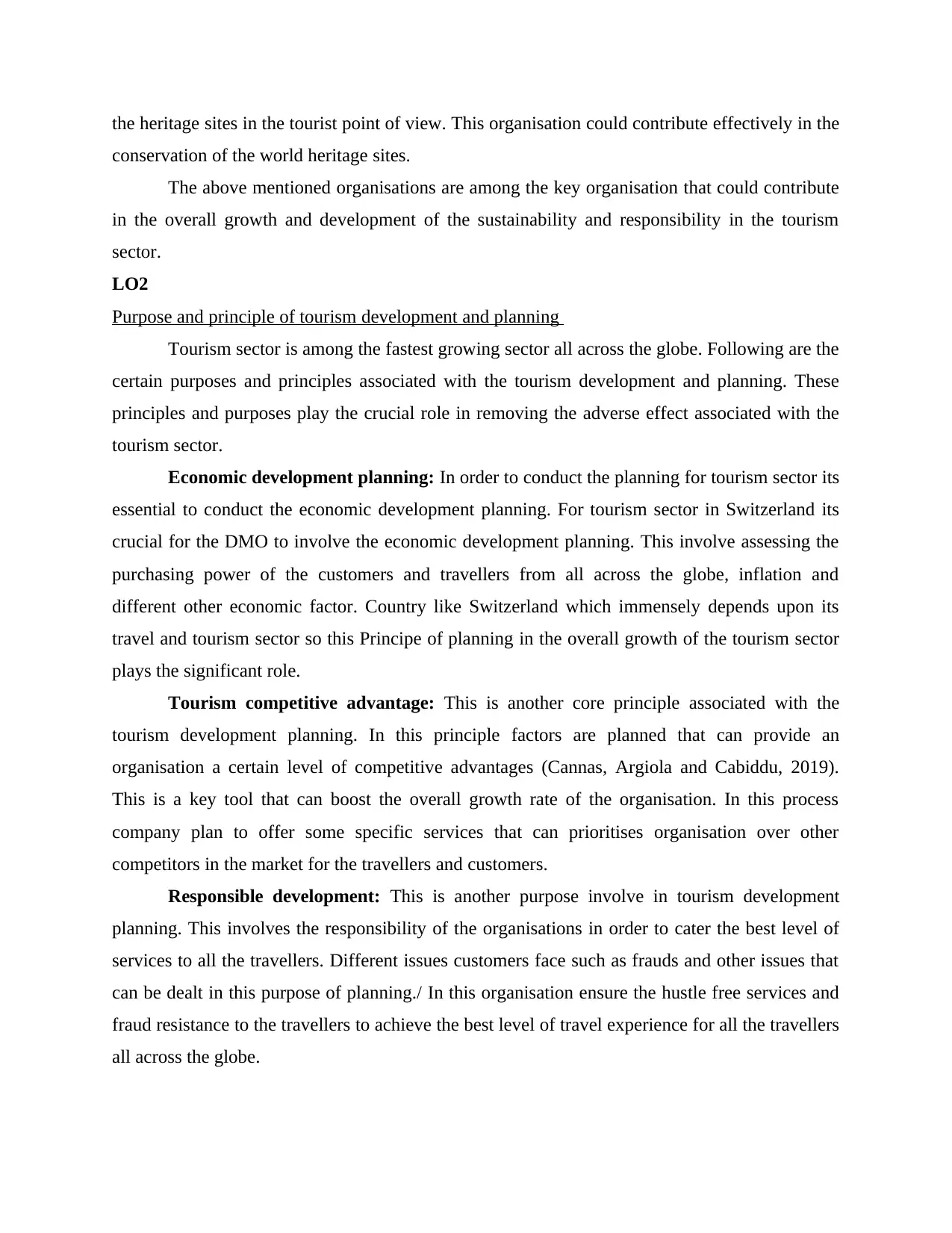
the heritage sites in the tourist point of view. This organisation could contribute effectively in the
conservation of the world heritage sites.
The above mentioned organisations are among the key organisation that could contribute
in the overall growth and development of the sustainability and responsibility in the tourism
sector.
LO2
Purpose and principle of tourism development and planning
Tourism sector is among the fastest growing sector all across the globe. Following are the
certain purposes and principles associated with the tourism development and planning. These
principles and purposes play the crucial role in removing the adverse effect associated with the
tourism sector.
Economic development planning: In order to conduct the planning for tourism sector its
essential to conduct the economic development planning. For tourism sector in Switzerland its
crucial for the DMO to involve the economic development planning. This involve assessing the
purchasing power of the customers and travellers from all across the globe, inflation and
different other economic factor. Country like Switzerland which immensely depends upon its
travel and tourism sector so this Principe of planning in the overall growth of the tourism sector
plays the significant role.
Tourism competitive advantage: This is another core principle associated with the
tourism development planning. In this principle factors are planned that can provide an
organisation a certain level of competitive advantages (Cannas, Argiola and Cabiddu, 2019).
This is a key tool that can boost the overall growth rate of the organisation. In this process
company plan to offer some specific services that can prioritises organisation over other
competitors in the market for the travellers and customers.
Responsible development: This is another purpose involve in tourism development
planning. This involves the responsibility of the organisations in order to cater the best level of
services to all the travellers. Different issues customers face such as frauds and other issues that
can be dealt in this purpose of planning./ In this organisation ensure the hustle free services and
fraud resistance to the travellers to achieve the best level of travel experience for all the travellers
all across the globe.
conservation of the world heritage sites.
The above mentioned organisations are among the key organisation that could contribute
in the overall growth and development of the sustainability and responsibility in the tourism
sector.
LO2
Purpose and principle of tourism development and planning
Tourism sector is among the fastest growing sector all across the globe. Following are the
certain purposes and principles associated with the tourism development and planning. These
principles and purposes play the crucial role in removing the adverse effect associated with the
tourism sector.
Economic development planning: In order to conduct the planning for tourism sector its
essential to conduct the economic development planning. For tourism sector in Switzerland its
crucial for the DMO to involve the economic development planning. This involve assessing the
purchasing power of the customers and travellers from all across the globe, inflation and
different other economic factor. Country like Switzerland which immensely depends upon its
travel and tourism sector so this Principe of planning in the overall growth of the tourism sector
plays the significant role.
Tourism competitive advantage: This is another core principle associated with the
tourism development planning. In this principle factors are planned that can provide an
organisation a certain level of competitive advantages (Cannas, Argiola and Cabiddu, 2019).
This is a key tool that can boost the overall growth rate of the organisation. In this process
company plan to offer some specific services that can prioritises organisation over other
competitors in the market for the travellers and customers.
Responsible development: This is another purpose involve in tourism development
planning. This involves the responsibility of the organisations in order to cater the best level of
services to all the travellers. Different issues customers face such as frauds and other issues that
can be dealt in this purpose of planning./ In this organisation ensure the hustle free services and
fraud resistance to the travellers to achieve the best level of travel experience for all the travellers
all across the globe.
Paraphrase This Document
Need a fresh take? Get an instant paraphrase of this document with our AI Paraphraser
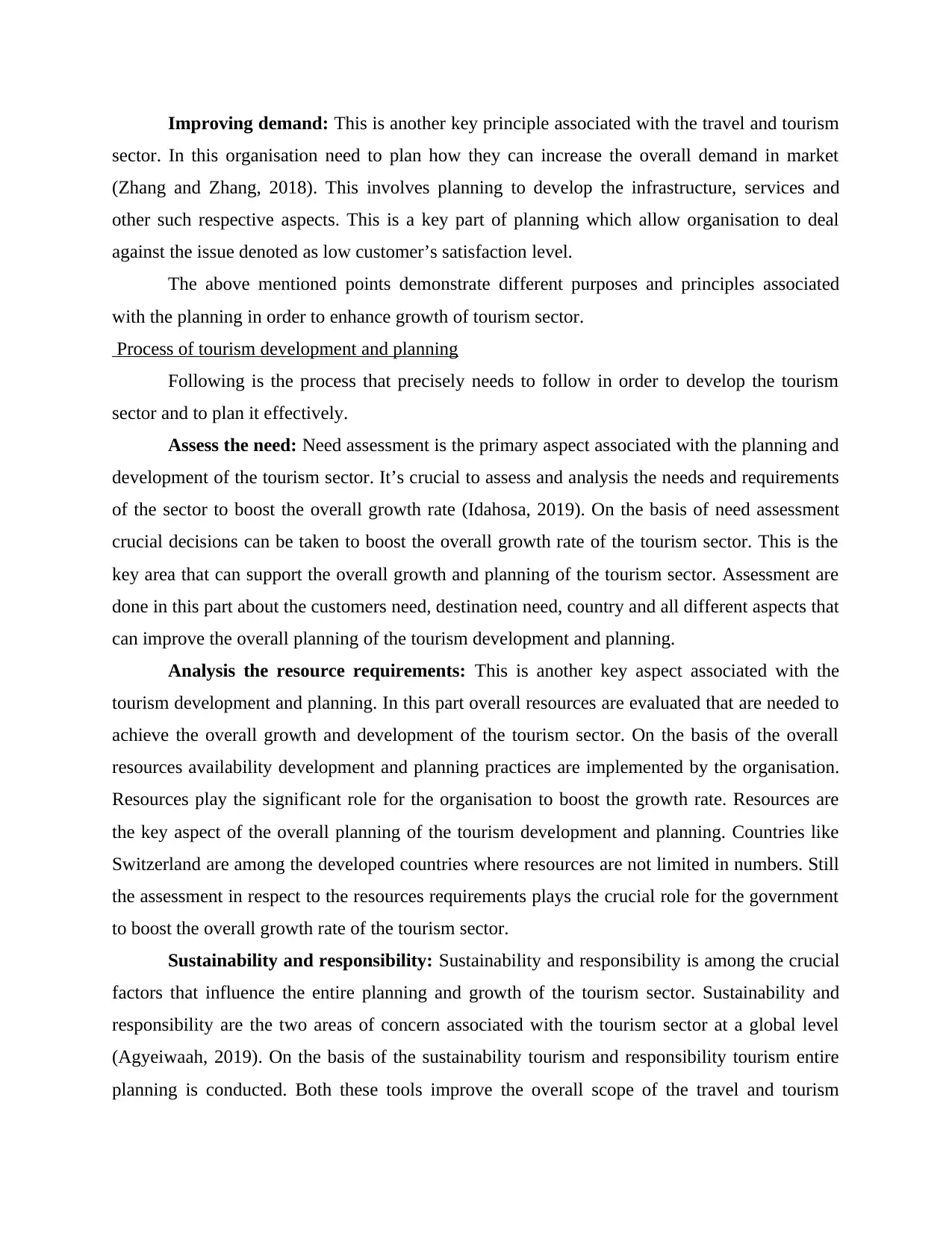
Improving demand: This is another key principle associated with the travel and tourism
sector. In this organisation need to plan how they can increase the overall demand in market
(Zhang and Zhang, 2018). This involves planning to develop the infrastructure, services and
other such respective aspects. This is a key part of planning which allow organisation to deal
against the issue denoted as low customer’s satisfaction level.
The above mentioned points demonstrate different purposes and principles associated
with the planning in order to enhance growth of tourism sector.
Process of tourism development and planning
Following is the process that precisely needs to follow in order to develop the tourism
sector and to plan it effectively.
Assess the need: Need assessment is the primary aspect associated with the planning and
development of the tourism sector. It’s crucial to assess and analysis the needs and requirements
of the sector to boost the overall growth rate (Idahosa, 2019). On the basis of need assessment
crucial decisions can be taken to boost the overall growth rate of the tourism sector. This is the
key area that can support the overall growth and planning of the tourism sector. Assessment are
done in this part about the customers need, destination need, country and all different aspects that
can improve the overall planning of the tourism development and planning.
Analysis the resource requirements: This is another key aspect associated with the
tourism development and planning. In this part overall resources are evaluated that are needed to
achieve the overall growth and development of the tourism sector. On the basis of the overall
resources availability development and planning practices are implemented by the organisation.
Resources play the significant role for the organisation to boost the growth rate. Resources are
the key aspect of the overall planning of the tourism development and planning. Countries like
Switzerland are among the developed countries where resources are not limited in numbers. Still
the assessment in respect to the resources requirements plays the crucial role for the government
to boost the overall growth rate of the tourism sector.
Sustainability and responsibility: Sustainability and responsibility is among the crucial
factors that influence the entire planning and growth of the tourism sector. Sustainability and
responsibility are the two areas of concern associated with the tourism sector at a global level
(Agyeiwaah, 2019). On the basis of the sustainability tourism and responsibility tourism entire
planning is conducted. Both these tools improve the overall scope of the travel and tourism
sector. In this organisation need to plan how they can increase the overall demand in market
(Zhang and Zhang, 2018). This involves planning to develop the infrastructure, services and
other such respective aspects. This is a key part of planning which allow organisation to deal
against the issue denoted as low customer’s satisfaction level.
The above mentioned points demonstrate different purposes and principles associated
with the planning in order to enhance growth of tourism sector.
Process of tourism development and planning
Following is the process that precisely needs to follow in order to develop the tourism
sector and to plan it effectively.
Assess the need: Need assessment is the primary aspect associated with the planning and
development of the tourism sector. It’s crucial to assess and analysis the needs and requirements
of the sector to boost the overall growth rate (Idahosa, 2019). On the basis of need assessment
crucial decisions can be taken to boost the overall growth rate of the tourism sector. This is the
key area that can support the overall growth and planning of the tourism sector. Assessment are
done in this part about the customers need, destination need, country and all different aspects that
can improve the overall planning of the tourism development and planning.
Analysis the resource requirements: This is another key aspect associated with the
tourism development and planning. In this part overall resources are evaluated that are needed to
achieve the overall growth and development of the tourism sector. On the basis of the overall
resources availability development and planning practices are implemented by the organisation.
Resources play the significant role for the organisation to boost the growth rate. Resources are
the key aspect of the overall planning of the tourism development and planning. Countries like
Switzerland are among the developed countries where resources are not limited in numbers. Still
the assessment in respect to the resources requirements plays the crucial role for the government
to boost the overall growth rate of the tourism sector.
Sustainability and responsibility: Sustainability and responsibility is among the crucial
factors that influence the entire planning and growth of the tourism sector. Sustainability and
responsibility are the two areas of concern associated with the tourism sector at a global level
(Agyeiwaah, 2019). On the basis of the sustainability tourism and responsibility tourism entire
planning is conducted. Both these tools improve the overall scope of the travel and tourism
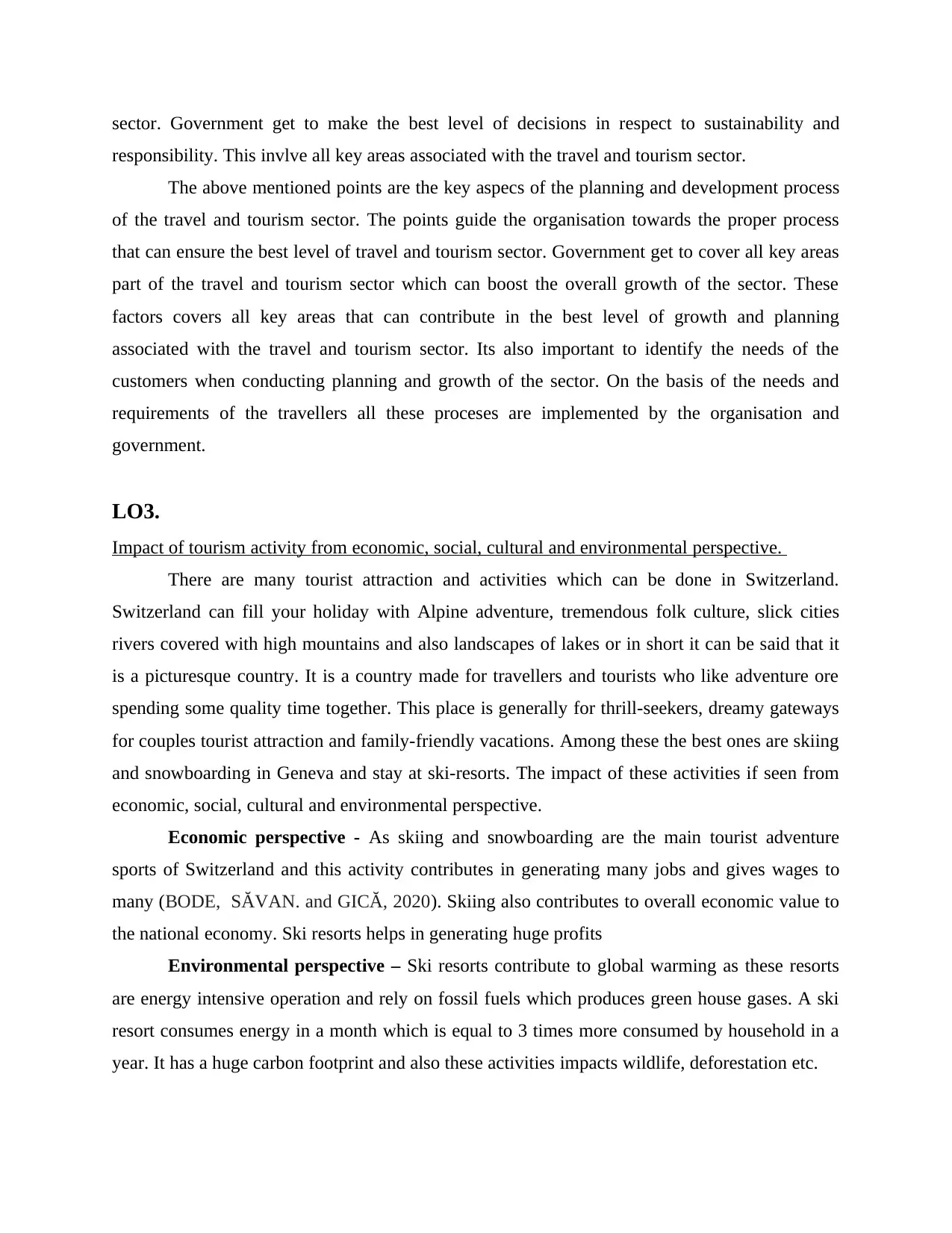
sector. Government get to make the best level of decisions in respect to sustainability and
responsibility. This invlve all key areas associated with the travel and tourism sector.
The above mentioned points are the key aspecs of the planning and development process
of the travel and tourism sector. The points guide the organisation towards the proper process
that can ensure the best level of travel and tourism sector. Government get to cover all key areas
part of the travel and tourism sector which can boost the overall growth of the sector. These
factors covers all key areas that can contribute in the best level of growth and planning
associated with the travel and tourism sector. Its also important to identify the needs of the
customers when conducting planning and growth of the sector. On the basis of the needs and
requirements of the travellers all these proceses are implemented by the organisation and
government.
LO3.
Impact of tourism activity from economic, social, cultural and environmental perspective.
There are many tourist attraction and activities which can be done in Switzerland.
Switzerland can fill your holiday with Alpine adventure, tremendous folk culture, slick cities
rivers covered with high mountains and also landscapes of lakes or in short it can be said that it
is a picturesque country. It is a country made for travellers and tourists who like adventure ore
spending some quality time together. This place is generally for thrill-seekers, dreamy gateways
for couples tourist attraction and family-friendly vacations. Among these the best ones are skiing
and snowboarding in Geneva and stay at ski-resorts. The impact of these activities if seen from
economic, social, cultural and environmental perspective.
Economic perspective - As skiing and snowboarding are the main tourist adventure
sports of Switzerland and this activity contributes in generating many jobs and gives wages to
many (BODE, SĂVAN. and GICĂ, 2020). Skiing also contributes to overall economic value to
the national economy. Ski resorts helps in generating huge profits
Environmental perspective – Ski resorts contribute to global warming as these resorts
are energy intensive operation and rely on fossil fuels which produces green house gases. A ski
resort consumes energy in a month which is equal to 3 times more consumed by household in a
year. It has a huge carbon footprint and also these activities impacts wildlife, deforestation etc.
responsibility. This invlve all key areas associated with the travel and tourism sector.
The above mentioned points are the key aspecs of the planning and development process
of the travel and tourism sector. The points guide the organisation towards the proper process
that can ensure the best level of travel and tourism sector. Government get to cover all key areas
part of the travel and tourism sector which can boost the overall growth of the sector. These
factors covers all key areas that can contribute in the best level of growth and planning
associated with the travel and tourism sector. Its also important to identify the needs of the
customers when conducting planning and growth of the sector. On the basis of the needs and
requirements of the travellers all these proceses are implemented by the organisation and
government.
LO3.
Impact of tourism activity from economic, social, cultural and environmental perspective.
There are many tourist attraction and activities which can be done in Switzerland.
Switzerland can fill your holiday with Alpine adventure, tremendous folk culture, slick cities
rivers covered with high mountains and also landscapes of lakes or in short it can be said that it
is a picturesque country. It is a country made for travellers and tourists who like adventure ore
spending some quality time together. This place is generally for thrill-seekers, dreamy gateways
for couples tourist attraction and family-friendly vacations. Among these the best ones are skiing
and snowboarding in Geneva and stay at ski-resorts. The impact of these activities if seen from
economic, social, cultural and environmental perspective.
Economic perspective - As skiing and snowboarding are the main tourist adventure
sports of Switzerland and this activity contributes in generating many jobs and gives wages to
many (BODE, SĂVAN. and GICĂ, 2020). Skiing also contributes to overall economic value to
the national economy. Ski resorts helps in generating huge profits
Environmental perspective – Ski resorts contribute to global warming as these resorts
are energy intensive operation and rely on fossil fuels which produces green house gases. A ski
resort consumes energy in a month which is equal to 3 times more consumed by household in a
year. It has a huge carbon footprint and also these activities impacts wildlife, deforestation etc.
⊘ This is a preview!⊘
Do you want full access?
Subscribe today to unlock all pages.

Trusted by 1+ million students worldwide
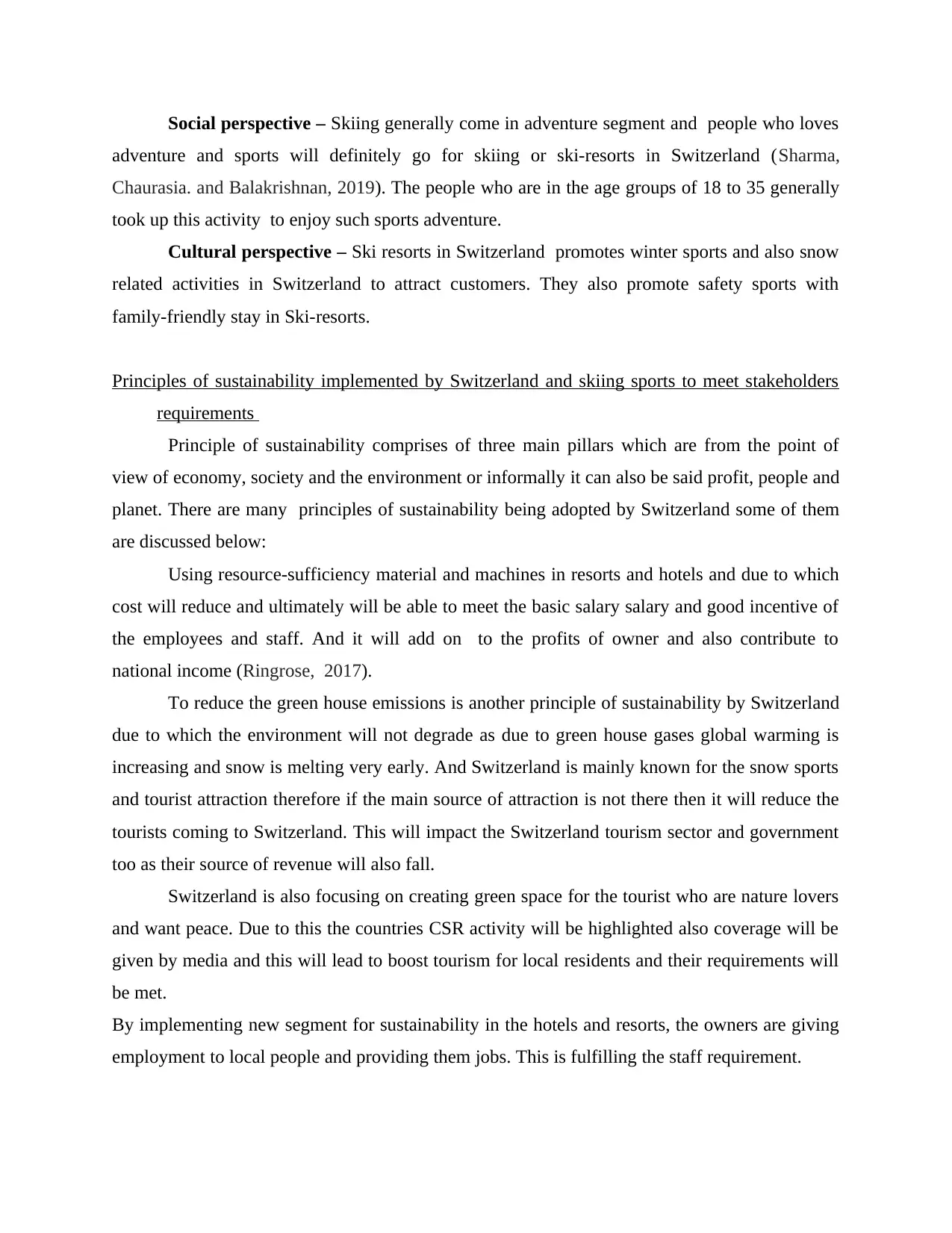
Social perspective – Skiing generally come in adventure segment and people who loves
adventure and sports will definitely go for skiing or ski-resorts in Switzerland (Sharma,
Chaurasia. and Balakrishnan, 2019). The people who are in the age groups of 18 to 35 generally
took up this activity to enjoy such sports adventure.
Cultural perspective – Ski resorts in Switzerland promotes winter sports and also snow
related activities in Switzerland to attract customers. They also promote safety sports with
family-friendly stay in Ski-resorts.
Principles of sustainability implemented by Switzerland and skiing sports to meet stakeholders
requirements
Principle of sustainability comprises of three main pillars which are from the point of
view of economy, society and the environment or informally it can also be said profit, people and
planet. There are many principles of sustainability being adopted by Switzerland some of them
are discussed below:
Using resource-sufficiency material and machines in resorts and hotels and due to which
cost will reduce and ultimately will be able to meet the basic salary salary and good incentive of
the employees and staff. And it will add on to the profits of owner and also contribute to
national income (Ringrose, 2017).
To reduce the green house emissions is another principle of sustainability by Switzerland
due to which the environment will not degrade as due to green house gases global warming is
increasing and snow is melting very early. And Switzerland is mainly known for the snow sports
and tourist attraction therefore if the main source of attraction is not there then it will reduce the
tourists coming to Switzerland. This will impact the Switzerland tourism sector and government
too as their source of revenue will also fall.
Switzerland is also focusing on creating green space for the tourist who are nature lovers
and want peace. Due to this the countries CSR activity will be highlighted also coverage will be
given by media and this will lead to boost tourism for local residents and their requirements will
be met.
By implementing new segment for sustainability in the hotels and resorts, the owners are giving
employment to local people and providing them jobs. This is fulfilling the staff requirement.
adventure and sports will definitely go for skiing or ski-resorts in Switzerland (Sharma,
Chaurasia. and Balakrishnan, 2019). The people who are in the age groups of 18 to 35 generally
took up this activity to enjoy such sports adventure.
Cultural perspective – Ski resorts in Switzerland promotes winter sports and also snow
related activities in Switzerland to attract customers. They also promote safety sports with
family-friendly stay in Ski-resorts.
Principles of sustainability implemented by Switzerland and skiing sports to meet stakeholders
requirements
Principle of sustainability comprises of three main pillars which are from the point of
view of economy, society and the environment or informally it can also be said profit, people and
planet. There are many principles of sustainability being adopted by Switzerland some of them
are discussed below:
Using resource-sufficiency material and machines in resorts and hotels and due to which
cost will reduce and ultimately will be able to meet the basic salary salary and good incentive of
the employees and staff. And it will add on to the profits of owner and also contribute to
national income (Ringrose, 2017).
To reduce the green house emissions is another principle of sustainability by Switzerland
due to which the environment will not degrade as due to green house gases global warming is
increasing and snow is melting very early. And Switzerland is mainly known for the snow sports
and tourist attraction therefore if the main source of attraction is not there then it will reduce the
tourists coming to Switzerland. This will impact the Switzerland tourism sector and government
too as their source of revenue will also fall.
Switzerland is also focusing on creating green space for the tourist who are nature lovers
and want peace. Due to this the countries CSR activity will be highlighted also coverage will be
given by media and this will lead to boost tourism for local residents and their requirements will
be met.
By implementing new segment for sustainability in the hotels and resorts, the owners are giving
employment to local people and providing them jobs. This is fulfilling the staff requirement.
Paraphrase This Document
Need a fresh take? Get an instant paraphrase of this document with our AI Paraphraser
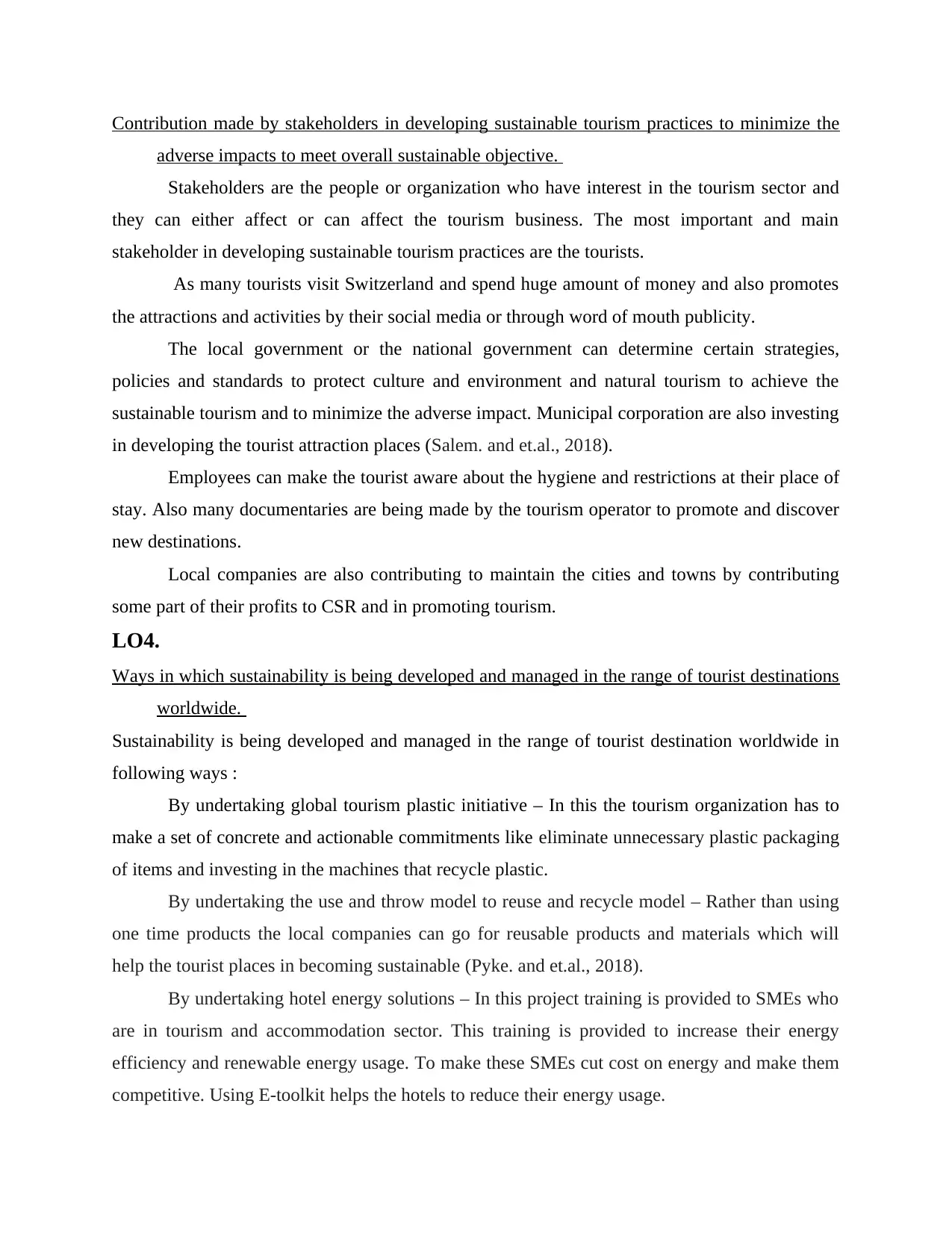
Contribution made by stakeholders in developing sustainable tourism practices to minimize the
adverse impacts to meet overall sustainable objective.
Stakeholders are the people or organization who have interest in the tourism sector and
they can either affect or can affect the tourism business. The most important and main
stakeholder in developing sustainable tourism practices are the tourists.
As many tourists visit Switzerland and spend huge amount of money and also promotes
the attractions and activities by their social media or through word of mouth publicity.
The local government or the national government can determine certain strategies,
policies and standards to protect culture and environment and natural tourism to achieve the
sustainable tourism and to minimize the adverse impact. Municipal corporation are also investing
in developing the tourist attraction places (Salem. and et.al., 2018).
Employees can make the tourist aware about the hygiene and restrictions at their place of
stay. Also many documentaries are being made by the tourism operator to promote and discover
new destinations.
Local companies are also contributing to maintain the cities and towns by contributing
some part of their profits to CSR and in promoting tourism.
LO4.
Ways in which sustainability is being developed and managed in the range of tourist destinations
worldwide.
Sustainability is being developed and managed in the range of tourist destination worldwide in
following ways :
By undertaking global tourism plastic initiative – In this the tourism organization has to
make a set of concrete and actionable commitments like eliminate unnecessary plastic packaging
of items and investing in the machines that recycle plastic.
By undertaking the use and throw model to reuse and recycle model – Rather than using
one time products the local companies can go for reusable products and materials which will
help the tourist places in becoming sustainable (Pyke. and et.al., 2018).
By undertaking hotel energy solutions – In this project training is provided to SMEs who
are in tourism and accommodation sector. This training is provided to increase their energy
efficiency and renewable energy usage. To make these SMEs cut cost on energy and make them
competitive. Using E-toolkit helps the hotels to reduce their energy usage.
adverse impacts to meet overall sustainable objective.
Stakeholders are the people or organization who have interest in the tourism sector and
they can either affect or can affect the tourism business. The most important and main
stakeholder in developing sustainable tourism practices are the tourists.
As many tourists visit Switzerland and spend huge amount of money and also promotes
the attractions and activities by their social media or through word of mouth publicity.
The local government or the national government can determine certain strategies,
policies and standards to protect culture and environment and natural tourism to achieve the
sustainable tourism and to minimize the adverse impact. Municipal corporation are also investing
in developing the tourist attraction places (Salem. and et.al., 2018).
Employees can make the tourist aware about the hygiene and restrictions at their place of
stay. Also many documentaries are being made by the tourism operator to promote and discover
new destinations.
Local companies are also contributing to maintain the cities and towns by contributing
some part of their profits to CSR and in promoting tourism.
LO4.
Ways in which sustainability is being developed and managed in the range of tourist destinations
worldwide.
Sustainability is being developed and managed in the range of tourist destination worldwide in
following ways :
By undertaking global tourism plastic initiative – In this the tourism organization has to
make a set of concrete and actionable commitments like eliminate unnecessary plastic packaging
of items and investing in the machines that recycle plastic.
By undertaking the use and throw model to reuse and recycle model – Rather than using
one time products the local companies can go for reusable products and materials which will
help the tourist places in becoming sustainable (Pyke. and et.al., 2018).
By undertaking hotel energy solutions – In this project training is provided to SMEs who
are in tourism and accommodation sector. This training is provided to increase their energy
efficiency and renewable energy usage. To make these SMEs cut cost on energy and make them
competitive. Using E-toolkit helps the hotels to reduce their energy usage.
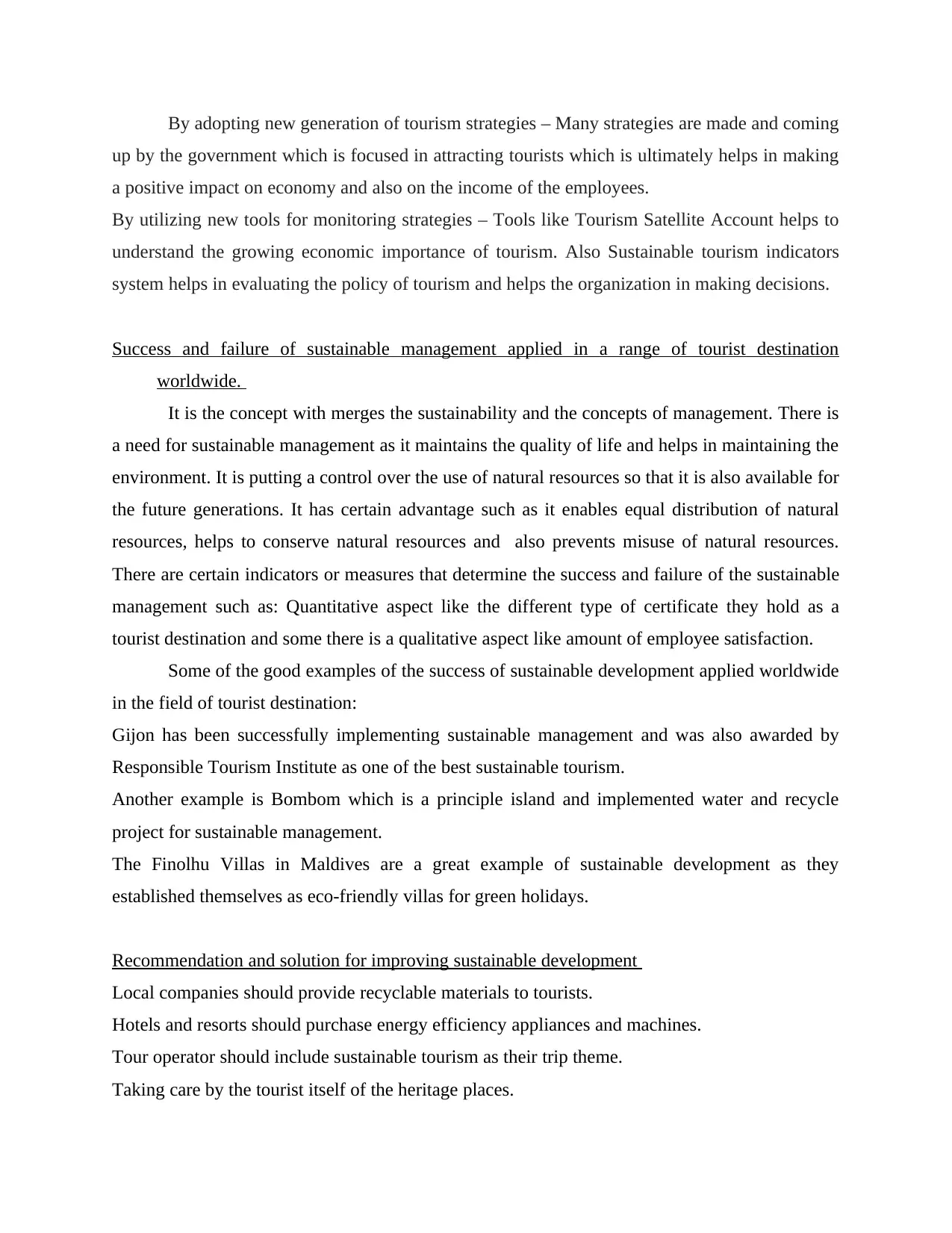
By adopting new generation of tourism strategies – Many strategies are made and coming
up by the government which is focused in attracting tourists which is ultimately helps in making
a positive impact on economy and also on the income of the employees.
By utilizing new tools for monitoring strategies – Tools like Tourism Satellite Account helps to
understand the growing economic importance of tourism. Also Sustainable tourism indicators
system helps in evaluating the policy of tourism and helps the organization in making decisions.
Success and failure of sustainable management applied in a range of tourist destination
worldwide.
It is the concept with merges the sustainability and the concepts of management. There is
a need for sustainable management as it maintains the quality of life and helps in maintaining the
environment. It is putting a control over the use of natural resources so that it is also available for
the future generations. It has certain advantage such as it enables equal distribution of natural
resources, helps to conserve natural resources and also prevents misuse of natural resources.
There are certain indicators or measures that determine the success and failure of the sustainable
management such as: Quantitative aspect like the different type of certificate they hold as a
tourist destination and some there is a qualitative aspect like amount of employee satisfaction.
Some of the good examples of the success of sustainable development applied worldwide
in the field of tourist destination:
Gijon has been successfully implementing sustainable management and was also awarded by
Responsible Tourism Institute as one of the best sustainable tourism.
Another example is Bombom which is a principle island and implemented water and recycle
project for sustainable management.
The Finolhu Villas in Maldives are a great example of sustainable development as they
established themselves as eco-friendly villas for green holidays.
Recommendation and solution for improving sustainable development
Local companies should provide recyclable materials to tourists.
Hotels and resorts should purchase energy efficiency appliances and machines.
Tour operator should include sustainable tourism as their trip theme.
Taking care by the tourist itself of the heritage places.
up by the government which is focused in attracting tourists which is ultimately helps in making
a positive impact on economy and also on the income of the employees.
By utilizing new tools for monitoring strategies – Tools like Tourism Satellite Account helps to
understand the growing economic importance of tourism. Also Sustainable tourism indicators
system helps in evaluating the policy of tourism and helps the organization in making decisions.
Success and failure of sustainable management applied in a range of tourist destination
worldwide.
It is the concept with merges the sustainability and the concepts of management. There is
a need for sustainable management as it maintains the quality of life and helps in maintaining the
environment. It is putting a control over the use of natural resources so that it is also available for
the future generations. It has certain advantage such as it enables equal distribution of natural
resources, helps to conserve natural resources and also prevents misuse of natural resources.
There are certain indicators or measures that determine the success and failure of the sustainable
management such as: Quantitative aspect like the different type of certificate they hold as a
tourist destination and some there is a qualitative aspect like amount of employee satisfaction.
Some of the good examples of the success of sustainable development applied worldwide
in the field of tourist destination:
Gijon has been successfully implementing sustainable management and was also awarded by
Responsible Tourism Institute as one of the best sustainable tourism.
Another example is Bombom which is a principle island and implemented water and recycle
project for sustainable management.
The Finolhu Villas in Maldives are a great example of sustainable development as they
established themselves as eco-friendly villas for green holidays.
Recommendation and solution for improving sustainable development
Local companies should provide recyclable materials to tourists.
Hotels and resorts should purchase energy efficiency appliances and machines.
Tour operator should include sustainable tourism as their trip theme.
Taking care by the tourist itself of the heritage places.
⊘ This is a preview!⊘
Do you want full access?
Subscribe today to unlock all pages.

Trusted by 1+ million students worldwide
1 out of 14
Related Documents
Your All-in-One AI-Powered Toolkit for Academic Success.
+13062052269
info@desklib.com
Available 24*7 on WhatsApp / Email
![[object Object]](/_next/static/media/star-bottom.7253800d.svg)
Unlock your academic potential
Copyright © 2020–2026 A2Z Services. All Rights Reserved. Developed and managed by ZUCOL.





